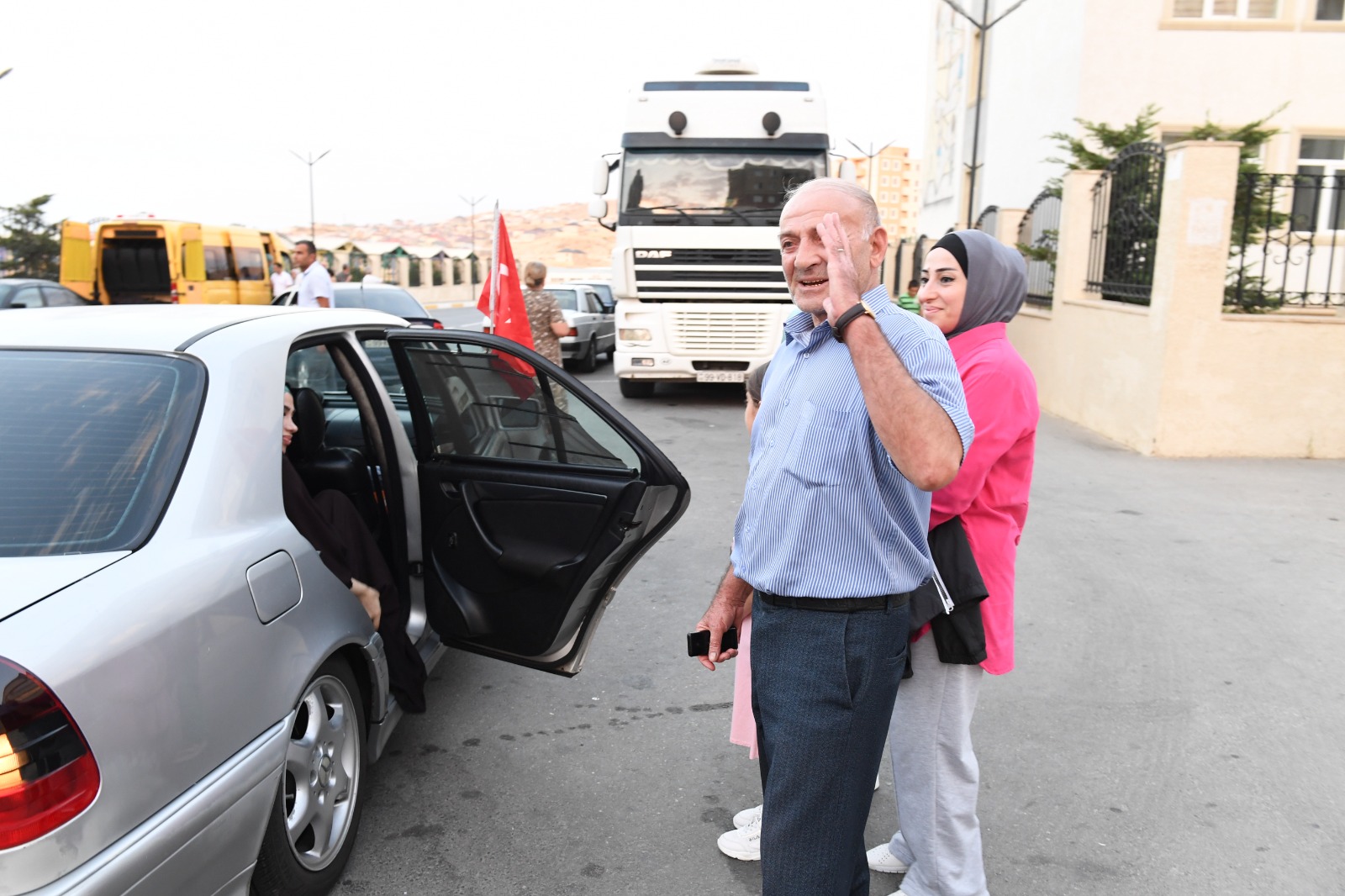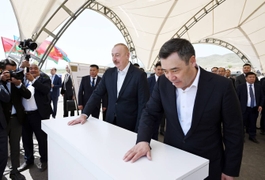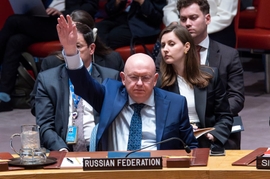The government of Azerbaijan successfully relocated the next group of the former internally displaced people (IDPs) to their recently liberated native lands as part of the state-run “Great Return” program.
On Tuesday, a total of 23 families, comprising 89 individuals, were bid farewell as they departed from their temporary residences in the capital city of Baku to the Fuzuli district.
In this initial stage of the relocation program, a total of 144 families, consisting of 509 individuals, are expected to return to the Fuzuli district. These families are currently residing in various locations, including the cities of Baku and Sumgayit, as well as throughout the Absheron region.
During the First Karabakh (Garabagh) War in the early 1990s, Armenia seized control of Azerbaijan’s Fuzuli district. In 2020, Azerbaijani forces liberated Fuzuli after almost three decades of unlawful occupation by Armenia, revealing the devastating consequences of Armenian vandalism, with the city of Fuzuli reduced to fragments of walls, devoid of intact buildings.
Presently, efforts are underway to rejuvenate the district as part of the Azerbaijani government’s comprehensive campaign to restore the territories that were liberated from Armenian occupation. The phased return of former IDPs to these liberated lands was initiated in July 2022. To date, more than 420 individuals from 96 families have been successfully resettled in the Aghali village within the Zangilan district. Further relocations are anticipated once the construction of new residential areas is finalized.
Between May and July, a total of 351 people from 93 families relocated to either restored or newly constructed residential complexes in the city of Lachin. Additionally, in March of this year, 20 families comprising 90 individuals returned to the village of Talysh in the Tartar district. By the conclusion of 2023, the residents of Sus and Zabukh villages in Lachin are also expected to return to their homes.
As part of the initial phases of the “Great Return” program, Baku has undertaken necessary measures to facilitate the repatriation of inhabitants to five liberated settlements – consisting of one city and four villages. The program aims to enable a total of 2,000 families, or 10,000 individuals, to return to their permanent residences in the Karabakh and East Zangazur economic regions by the year’s end.
In November 2022, President Aliyev signed a decree approving the “First State Program on the Great Return to Azerbaijan’s Liberated Territories,” outlining the preparation of 280,000 hectares (692,000 acres) of land in the Karabakh and East Zangazur regions for resettlement by 2026. By that same year, approximately 34,500 families are expected to relocate to the Karabakh and East Zangazur regions, necessitating the construction of 34,500 apartments and private houses.
Following the liberation of the Karabakh and East Zangazur regions from Armenian occupation during a 44-day war in 2020, the Azerbaijani government embarked on extensive infrastructure initiatives to restore the region.
The two historic and internationally recognized regions of Azerbaijan were invaded by the Armenian military following the Soviet Union’s dissolution in 1991. The war ended in a ceasefire in 1994 and resulted in Armenia forcibly occupying 20 percent of Azerbaijan’s internationally recognized territories. Over 30,000 Azerbaijanis were killed, 3,890 went missing, and one million were expelled from these lands in a brutal ethnic cleansing campaign carried out by Armenia.
On September 27, 2020, the Armenia-Azerbaijan conflict took a violent turn when Armenia’s forces deployed in occupied Azerbaijani lands shelled military positions and civilian settlements of Azerbaijan. During the 44 days of the war, the Azerbaijani forces liberated over 300 settlements, including the cities of Jabrayil, Fuzuli, Zangilan, Gubadli, and Shusha, from a nearly 30-year-long illegal Armenian occupation. The war ended with the signing of a tripartite statement by Armenia, Azerbaijan and Russia on November 10, 2020. Under the agreement, Armenia also returned the occupied Aghdam, Kalbajar, and Lachin districts to Azerbaijan.
In the year 2023, the state budget allocates AZN 5.26 billion, equivalent to $3.1 billion, for ongoing and new reconstruction projects in the liberated Karabakh and East Zangazur regions. President Aliyev affirmed that the total investments for these projects will reach AZN 12 billion, or $7 billion, by year’s end. In 2022, the revival of the liberated lands received an investment of AZN 4.315 billion, or $2.5 billion. For the year 2021, the financial allocation for this purpose amounted to AZN 2.178 billion ($1.28 billion).







 President Ilham Aliyev shed light on the evolving contours of the peace process with Armenia during an international conference in Baku this week. ...
President Ilham Aliyev shed light on the evolving contours of the peace process with Armenia during an international conference in Baku this week. ...
 Azerbaijan and Armenia started the process of demarcation of their border on Tuesday, with the installation of the first border markers based on ge...
Azerbaijan and Armenia started the process of demarcation of their border on Tuesday, with the installation of the first border markers based on ge...
 Iranian President Ebrahim Raisi expressed Tehran’s readiness to participate in significant development projects in Sri Lanka during the inauguratio...
Iranian President Ebrahim Raisi expressed Tehran’s readiness to participate in significant development projects in Sri Lanka during the inauguratio...
 Iran and Pakistan have signed eight cooperation documents in various fields, and agreed to strengthen ties to fight terrorism in the region.
Iran and Pakistan have signed eight cooperation documents in various fields, and agreed to strengthen ties to fight terrorism in the region.
 As the conflict between Ukraine and Russia escalates, the strategic importance of Kharkiv, Ukraine's second-largest city, has come sharply into focus.
As the conflict between Ukraine and Russia escalates, the strategic importance of Kharkiv, Ukraine's second-largest city, has come sharply into focus.



